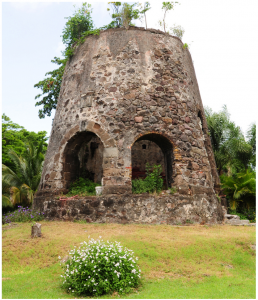The McDowalls of Castle Semple started out in the Caribbean in the 1690s. Like their friends, the Millikens, who were partners and relatives by marriage, their careers were different from what we are told in the history books. Rather than soldiers, they went out there as slave overseers, and worked their way up to sugar planters.
At any one time the McDowalls were responsible for the control of at least 1,000 Africans, on their own plantations, and through managing others. They also dabbled in slave trading. In 1726 their overcrowded slave ship, named after Milliken’s daughter, overturned, drowning 272 Africans.
At home the McDowalls served in all the leading positions, as patrons of the parish kirk, Rectors of Glasgow University, and MPs. In the third generation James McDowall was Provost of Glasgow, and chairman of the society opposing the abolition of slavery. After 1800 the family firm went bankrupt. However, in 1834 the fourth generation of the McDowalls still held onto sugar plantations on Grenada and St. Vincent. The Slave Compensation records show that the family were awarded compensation for the loss of 427 Africans.
For more than a century, the McDowalls used their sugar money to improve Lochwinnoch Parish. In 1818 they were celebrated for contributing the most in the county towards building new roads and bridges. The McDowalls and Millikens were pioneers in showing the potential income from sugar plantations. The income from a 150 acre sugar plantation in the 1780s was many times the income from a similar sized Renfrewshire farm.
After 1810, Castle Semple passed to the Harveys, another sugar planting family. The Harveys had two plantations on Antigua in the late 1730s and expanded south to Grenada, with a further five sugar plantations.
The Harvey name was important enough to hold onto, even when their plantations passed to relations. The family created a succession of double-barrelled names including Rae-Harvey and Shand-Harvey. By the 1830’s, Castle Semple was owned by Major James Lee-Harvey. In 1834 the family were awarded £26,392 for the loss of their slaves. It is interesting that the compensation was for the loss of a total of 1,204 African men, women and children – more than one African for every improved acre of their Castle Semple estate at the time.
A future article will explain how the McDowalls and Millikens became ‘fixers’ among Renfrewshire’s landed elite. They showed others the vast income possible from owning plantations. They also arranged positions for sons as overseers, and married off daughters to sugar planters.

McDowall’s Sugar Mill, Grenada
© 2019 Stuart Nisbet

